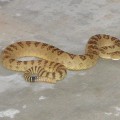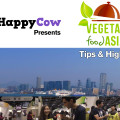
By Françoise Hébrard
A history of the English word *VEGAN*: it was invented in 1943 by Donald Watson by contracting the word *VEGetariAN*. At that time, a drift from strict vegetarianism took place in England when eggs and dairy products were added to the diet. Therefore, a *vegan* association was created to regain the initial values of strict vegetarianism. Besides the diet, a vegan has to respect in all other aspects of his life (clothing, transportation, sport, etc.) the right of animals to live as much as possible a free and natural life.
Since about 15 000 years ago, hunting has been gradually replaced by farming and manual labour by agriculture. This change has facilitated our survival and settlement but has thrown humanity into a speciesist civilization. Speciesism is an ideological elitism that favours the interests of our species at the expense of other animal species. It justifies and imposes the exploitation, use and abuse of animals judged to be inferior, in a way that would be intolerable if the victim would be human. This speciesist elitism and its arrogant pride is to species what sexism and racism are to gender and races, respectively, i.e. not taking the interests of some into account for the sake of others by pretending that there are real or imaginary differences. We all follow a tradition that exploits farm animals. We evolved by adopting vegetarianism under its different subdivisions (ova-lacto…), often for personal reasons such as health, but much less out of consideration for the suffering of the animals and the ecological system. Some lacto-vegetarians do not realise that we are able to milk a cow, even organically, because it gave birth to a calf that has been taken away at its birth and is fed soy substitutes in deplorable isolation. If the calf is a male, its life ends in a slaughterhouse after a few weeks while if it is a female, it is raised to become a dairy cow, thereby maintaining the vicious circle and infernal suffering.
In the 21st century, to fully realize our human authenticity, speciesism should become a taboo just like cannibalism, so that we get rid of the predator-prey relationship with animals and our environment in general. We should respect the life of other living creatures at all costs and adopt the ethics of non-speciesism or veganism, which advocates banning the use of any product of animal origin, not only those used to feed ourselves but also those used: to dress ourselves, to heal ourselves, to work, for scientific research, for religious ceremonies or sports, for housekeeping and our personal hygiene, make up, etc…
Being vegan implies also, within the limits of the current organic agriculture, the veganiculture, which is an organic agriculture without the utilization of products of animal origin, as well as sharing land with all other living things.
Our new relationship with animals, with which we share the planet, should be based on respect and total non-interference. The sole exception is animals that are harmful to our hygiene and well-being in our own territory (habitation, cultivated organic lands, etc.), where we have the responsibility to interfere and remove the animal (in the kindest way possible) so that we don’t become prey ourselves.
Furthermore, we should abstain from owning domestic animals for whatever purpose. The danger in owning animals is that it leads to a speciesist attitude and to behaviour of predator-prey; and yet all of this is to satisfy emotional needs that could be satisfied differently.
Domesticated animals, for the majority of humans, have been our foster mothers for so many years that their very presence can comfort us. It is this ability to give comfort, incidentally, that we exploit through the practice of animal therapy. From an emotional point of view, being close to a domesticated animal nourishes our ancestral animality, which takes us away from the discovery of our human authenticity. Sometimes an image is worth a thousand words: if you take a look at your hand, you can align and join your thumb with the other fingers. This is the symbol that humans are part of the animal world. You can also move your thumb aside and place it perpendicular to the other fingers, a symbol of detachment, reversal, the salutary opposition to the animal kingdom and its predator-prey behaviour to embrace the conviviality, to give before taking, to live along with and not live by using.
Concerning plants, the same reasoning applies. Our old habits of decorating our homes with green plants, nourish certainly our emotions, but at the cost of depriving those living plants of the sky-earth connection of their natural habitat. Also, we have to take care of them, thus creating once again the predator-prey relation. Plants differ from animals because they need most of the time intermediaries to reproduce (wind, insects, animals…). The organic gardener participates with his work to the reproduction of the plant by keeping the best seeds of his harvest for the next year and consuming or selling the rest as food. Like this the organic gardener enhances the humus of the arable land while protecting lake and groundwater. His vegetable crop tastes better and the absence of pesticides and chemical fertilizers is beneficial to our health.
The total non-interference in the animal world and the absence of green plants in our homes may seem extreme, but the behaviours are completely in line with the notions of conviviality, which goes against the speciesist predator-prey relation. It is for those reasons that a strict vegan, who not only takes the animal kingdom into account but also the plant kingdom and the environment in general, is also called an ecovegan, to distinguish him from a vegan that often thinks that he has the responsibility to rescue domestic animals that have been abandoned by their old masters.
To live as an ecovegan, though no longer involved with the animal kingdom, we are still relying heavily on plant and mineral kingdoms, meaning we must pay one’s debt to the “Spirits of Nature” to enjoy fairly from their beneficial effects. This tribute comes in the form of adopting the life attitudes expressed in the Ten “A”s (see the following chart). These ten “A”s are ten Treasures of humanity passed on by the four great religions (Islam, Hinduism, Judaism and Christianity) and the four great traditions (shamanism, animism, shintô and Ancient Egyptian culture) as well as the two great oriental philosophies (Buddhism and Dao). Each of these ten Treasures comes as a small sentence beginning by an “A” that expresses a new way of living for the 21st century. In return for this tribute, the “Spirits of nature” provide the ecovegan with, not just equitable sustenance, but an “Ecovegan Meditation Table” and a natural mental medicine, that can bring us into balance and restore health in our daily lives.
To summarize, for a sustainable future with minimal ecological impact, the ecovegan ethic is founded upon an organic vegan diet. It encourages ecological consumption, a deliberate simplicity, birth control, a fair economy and a genuine participative democracy. Adopting these convivial attitudes would put an end to the predator-prey relation we have maintained for 15, 000 years with our planet.
In conclusion, no individual action is more revolutionary and radical than adopting an ecovegan lifestyle for ethical reasons. This brings out our human authenticity, a feeling of inner peace, of freedom and a joy of living by spreading a new culture of respect, of kindness, of equality and a connection with all the other living things. Speciesism, in objectifying animals, feeds our *dark* side and keeps us in superficiality and illusions, lowering thereby our natural intelligence that creates connections between our thoughts and actions.
An explanation of “Ecovegan Meditation Table” (PDF) and natural mental medicine can be found in the document “Ecoveganism”.
The ten “A’s”
1. Acceptation with joy of the proposed path.
2. Adaptation to new ideas.
3. Alliance of a real need with its appropriate form.
4. Aspiration towards convivial engagement.
5. Approbation by our Ancestors.
6. Activation of space-time continuum awareness.
7. Accomplishment in the duty to correct our errors.
8. Association of thesis with antithesis to reach a superior level by synthesis.
9. Adjustment of knowledge, thought, speech, action, work, effort, attention and concentration.
10. Authenticity as the ultimate human self-realization.
For more information please contact: francoisehebrard (at) yahoo.ca
Montreal April 22nd 2011






3 Comments
JohnnySensible (31 comments)
May 11, 2010 at 6:23 amExcellent!
For the original / longer article in French go here – http://www.veganquebec.net/IMG/pdf/essentiel_du_vegetalisme.pdf
Chia (324 comments)
May 21, 2010 at 12:46 pmThanks for this thoughtful article. While I fully understand and agree with you, I just want to comment that it’s a challenge for humans to act ETHICAL always or most of the time. That’s why so many people refuse to hear or acknowledge the facts behind animals rights and environmental preservation and the inter-connectedness of all things.
beticita (1 comments)
April 23, 2011 at 8:57 amI totally agree with everything…I posted this blog on my Facebook. Some people just need some answers…really getting tired of being treated like I am from another planet. Then I realized the lack of information and education among those people asking me: Why are you a vegan?..what do you eat?..please!.
Now, regarding domesticated animals, I have certain doubts and a question. How about the thousands or millions of homeless dogs and cats?. Are they on that group?, I hope not..I had and have cats and they enjoyed being with my husband and I. We also try to give them their space in my beautiful backyard, with plants,places that they can hide as if they are in the forest, bird baths and open space to feel free and in touch with their natural instincts. We really fall in the category of ecovegans and we engaged in this practice king of late in life, unfortunately but never too late right?. I hope I am not doing something bad by saving stray cats ( all my cats are strays ) and take me out of that category, which I am proud to be part of.